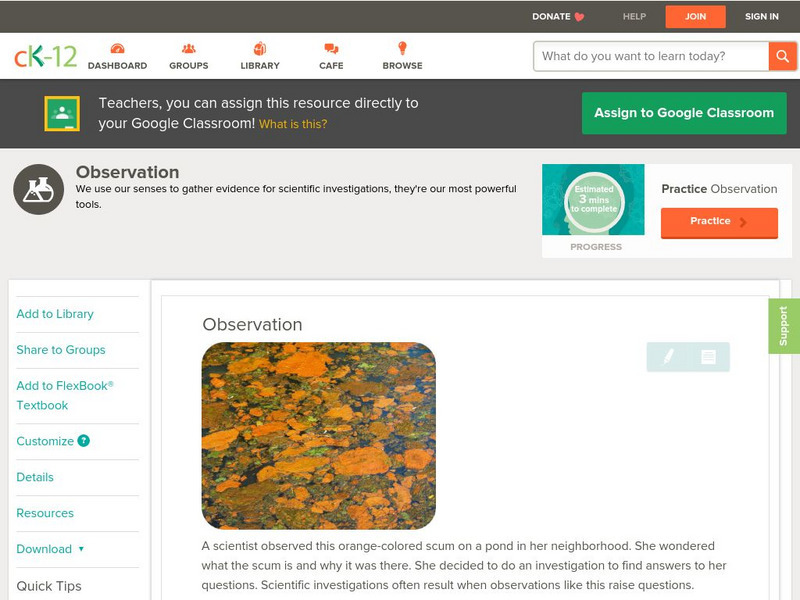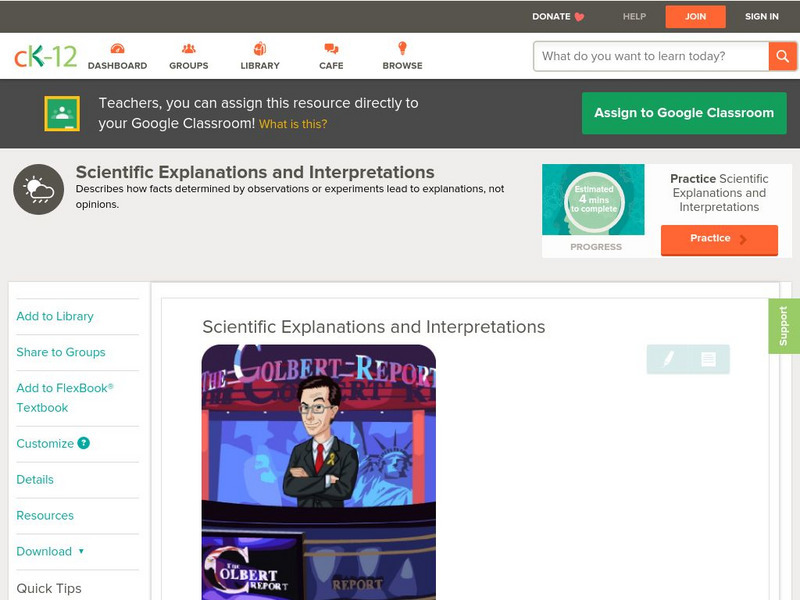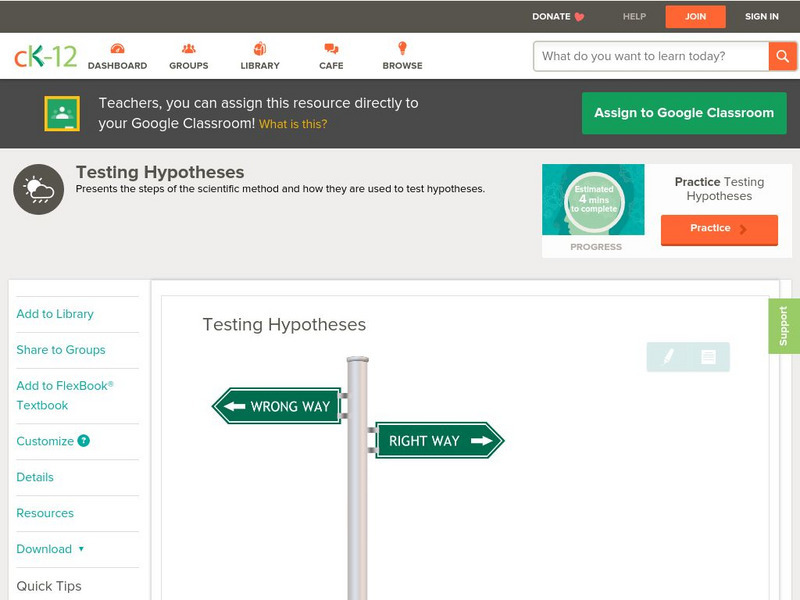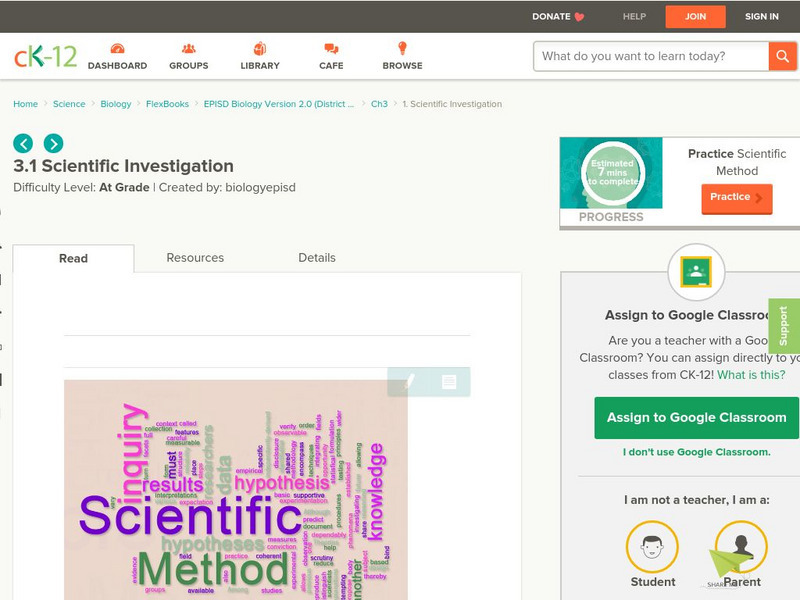CK-12 Foundation
Ck 12: Physical Science: Scientific Theory
[Free Registration/Login may be required to access all resource tools.] Nature of scientific theories, examples of physical science theories, and the law of parsimony.
CK-12 Foundation
Ck 12: Physical Science: Scientific Law
[Free Registration/Login may be required to access all resource tools.] Nature of scientific laws, examples of physical science laws, and how scientific laws differ from scientific theories.
CK-12 Foundation
Ck 12: Physical Science: Observation
[Free Registration/Login may be required to access all resource tools.] Observation and its role in scientific investigation.
CK-12 Foundation
Ck 12: Physical Science: Scientific Graphing
[Free Registration/Login may be required to access all resource tools.] Usefulness and types of graphs.
Science Buddies
Science Buddies: Scientific Method Data Analysis/graphs
At the end of your experiment you should review all of the data you have collected. See samples of data analysis charts and graphs. Find out what makes for a good chart or graph using the self-grading rubrics.
CK-12 Foundation
Ck 12: Earth Science: Experiments and Hypotheses Study Guide
[Free Registration/Login may be required to access all resource tools.] This study guide summarizes key points about the scientific method and hypotheses.
Discovery Education
Discovery Education: Science of Everyday Life: Everyday Science of Eggs [Pdf]
A lab where students can investigate eggs and what happens to egg whites after they are beaten. Lesson plan includes teacher background, standards, and a procedure for students to develop their own experiment.
CK-12 Foundation
Ck 12: Earth Science : Scientific Explanations and Interpretations
[Free Registration/Login may be required to access all resource tools.] Presents the relationships of facts, explanations, and opinions in science.
CK-12 Foundation
Ck 12: Earth Science: Testing Hypotheses
[Free Registration/Login may be required to access all resource tools.] Learn the steps of how to test hypotheses.
CK-12 Foundation
Ck 12: Scientific Investigation
[Free Registration/Login may be required to access all resource tools.] This lesson looks at how the scientific method is applied in a scientific investigation, and at the differences between theories and hypotheses in science.
Alabama Learning Exchange
Alex: Bloodstain Pattern Doesn't Lie
Students will formulate a hypothesis about the relationship (linear, direct, indirect, etc.) between the distance a drop of blood falls and the diameter of the splatter it makes. To test their hypothesis, the students will work...
Alabama Learning Exchange
Alex: The Legend of the Mummy's Curse Fact or Fiction?
This is a technology-based, hands-on Biology lesson used to introduce the scientific method to students. Students will make a prediction on whether they think the curse is true or false. Students will listen to a podcast describing a...
Alabama Learning Exchange
Alex: Questioning Nasa
In this lesson students will work collaboratively to explore the "Big Question" that led up to this lesson was "Why are there two solid rocket boosters used to launch the space shuttle instead of one with the same amount of fuel?" This...
Alabama Learning Exchange
Alex: Beyond the Earth Part Ii
A continuation of Beyond the Earth Part I. As part of a unit on the solar system, students will choose a component of the solar system to research. Students may use a variety of resources such as the Internet, books, and reference...
Alabama Learning Exchange
Alex: Away We Go!
Students will survey various classes about the type of transportation that delivers them to school. Students will then combine data and with the help of a teacher create a virtual graph. This lesson plan was created as a result of the...
Alabama Learning Exchange
Alex: Science Is a Wonderland
This is an inquiry lesson to teach students critical thinking skills. The student will learn through discovery what inquiry skills are and how they are used. They will learn how scientists use these skills in the scientific method to do...
Alabama Learning Exchange
Alex: Something's Fishy: A Lesson in Biological Sampling
Determining the population in a larger area by tagging. By using proper scientific method and careful sampling procedures, students learn how biologists work in the field to collect data about a population. Students will also calculate...
Alabama Learning Exchange
Alex: Chemistry Is Colorful!!
In this lesson ,students are introduced to the five major types of chemical reactions reaction type will be analyzed and examples will be noted. Students will then perform a lab investigation which includes each of the different reaction...
Alabama Learning Exchange
Alex: Where Did You Get Those "Jeans"?
This lesson plan can be interdisciplinary involving science, mathematics, and language arts. The primary nature of the lesson plan is inquiry, project, and technology-based. In science this project is a culminating activity in the...
Alabama Learning Exchange
Alex: Mystery Powder Investigation
During this lesson, young scholars will work individually to identify a mystery powder. Students will have the opportunity to test known powders with different substances and record observations. Young scholars will develop a plan that...
Alabama Learning Exchange
Alex: Teaching the Scientific Method
Life is one project after another, no matter what career field one chooses. The responsibility of planning a project is a valuable activity for middle schoolers that applies to most career fields. This method requires students to answer...
Alabama Learning Exchange
Alex: Bubble Bubble
This lesson will help young students understand the shape and movement of bubbles. Students will predict, practice, and record results as they blow bubbles with different-shaped objects.
Alabama Learning Exchange
Alex: Chemical Reaction in a Bag
Students will use scientific methods in creating and observing a chemical reaction.
CK-12 Foundation
Ck 12: Biology: Basics of Science Study Guide
This comprehensive study guide covers the key terms and basic concepts needed for an intro to science unit.





















